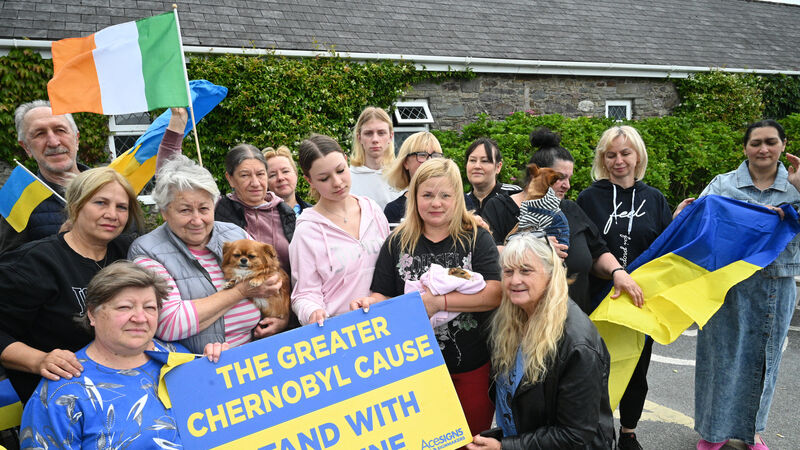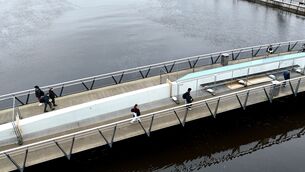Decision to relocate Ukrainians from Cork base 'doesn't make sense'

Fiona Corcoran of The Greater Chernobyl Cause pictured in June with some of the 120 Ukrainian war refugees and pets who were housed at the Green Glens Arena at Millstreet. Picture: Larry Cummins.
It has emerged that within the last week Ukrainians who fled the the war in their homeland and were placed in accommodation in Millstreet, Co Cork have been moved on to new areas.
Earlier this summer some 120 Ukrainians at the Green Glens Arena were told they had to leave the facility by the end of August. At the time residents were distraught at the decision by the Department of Justice to relocate them from the site, and issued an appeal via the media to remain.
Founder of the Greater Chernobyl Cause, Cork woman Fiona Corcoran, has criticised the decision to end the arrangement for Ukrainians that was in place in Millstreet.
“They left last Thursday. My heart breaks for them. They were resigned to the fact that they were leaving and going to new homes spread around Kerry, Cork, Waterford etc."
"It made no sense to me to have them leave. It is a joke to say that it is a cost saving. The left hand doesn’t know what the right hand is doing," said Ms Corcoran.
Ms Corcoran said that the decision to move the Ukrainian community from Millstreet was made without any consultation. There is no plan for the reallocation of the accommodation to other persons seeking shelter.
Ms Corcoran adds that there was a huge sense of anxiety among the residents when they received their notice to leave.
Speaking in June of this year Valeria Marchenko from Mariupol said that she was desperate not to leave her home of three years in Millstreet.
“Even though I didn’t speak English at first, I was hired (locally). My husband has been working as a welder for the past three years. I have never met people as kind and generous as those in Ireland. They gave us a home, and we are truly happy to be here," said Ms Marchenko.
"We’re glad that we can contribute something in return. We pay our taxes, we work, and we’re proud to be part of this community. The arena is like a big family, we help and support each other. Please don’t take my home away from me.”
Ms Marchenko said that when the war broke out in February 2022 her husband was away working and she was living with her mother.
"On March 8th, my godmother passed away. I took a shovel and dug a grave in our yard. I don’t know where I found the strength, but I buried her. I tried to dig deep enough so that the body wouldn't be disturbed by animals," said Ms Marchenko.
"There was no one left in the city — no doctors, no police, nothing was functioning. When there were fierce battles for access to water, we had to crawl on the ground to reach the sea. There was a stream about 2–3 kilometres away. When we couldn’t cook over a fire, we ate snow. Food was given to the children first. There were around 30 people in the basement.
"I still remember how one young man's leg was torn off when he went out to get food. They tried to save him — they cut away the shrapnel with a kitchen knife and put a burning log or coal on the wound to cauterize it. But sadly, he didn’t survive. He remained dead with us in the basement for another five days until we could finally carry him out and bury him," said Ms Marchenko
Ms Marchenko said that her mother was too terrified to even leave the basement.
“But when the Russians entered, we left the city. My dad lived in the nearby village of Volodarsk. My mom, my cat, my dog, and I walked 22 kilometres. The city was closed, and my dad didn’t know whether I was alive or not. He tried to get into Mariupol five times, but they wouldn’t let him in.
"A military bus eventually took us from Volodarsk to Taganrog. From Taganrog, we made our way to Lithuania. My mom’s husband was waiting for us there. My husband’s family was already in Ireland because they had a car and had managed to leave earlier. My husband and I later flew to Ireland," said Ms "Marchenko
"We were welcomed with smiles and kindness. People gave us food, clothes, and housing. I want to say that, throughout this incredibly difficult journey, I didn’t meet a single bad person. I am deeply grateful to Ireland and its people.”
In a statement issued in June the Department of Justice said that all accommodation contracted by the Department “is temporary in nature.”
“Ukrainian citizens are advised of this when requesting emergency accommodation. As the demand for accommodation for Ukrainian citizens decreases, and they make their own independent arrangements for accommodation, the department is carrying vacancies in commercial contracts. As a result, the department ends contracts on a regular basis in order to ensure value for money and greater oversight of the portfolio," read the statement.
"We need to provide the best we can for all those who come to Ireland fleeing war or oppression in Ukraine and other countries, while balancing this with the requirement to make best possible use of State funds," it added,
"The department has sent updates, through the accommodation providers, to the residents who will be affected, to let them know that the contract is ending with that provider. The department has also informed the residents that if they wish to continue to receive State-funded accommodation, it will be provided in another location.”










 App?
App?


